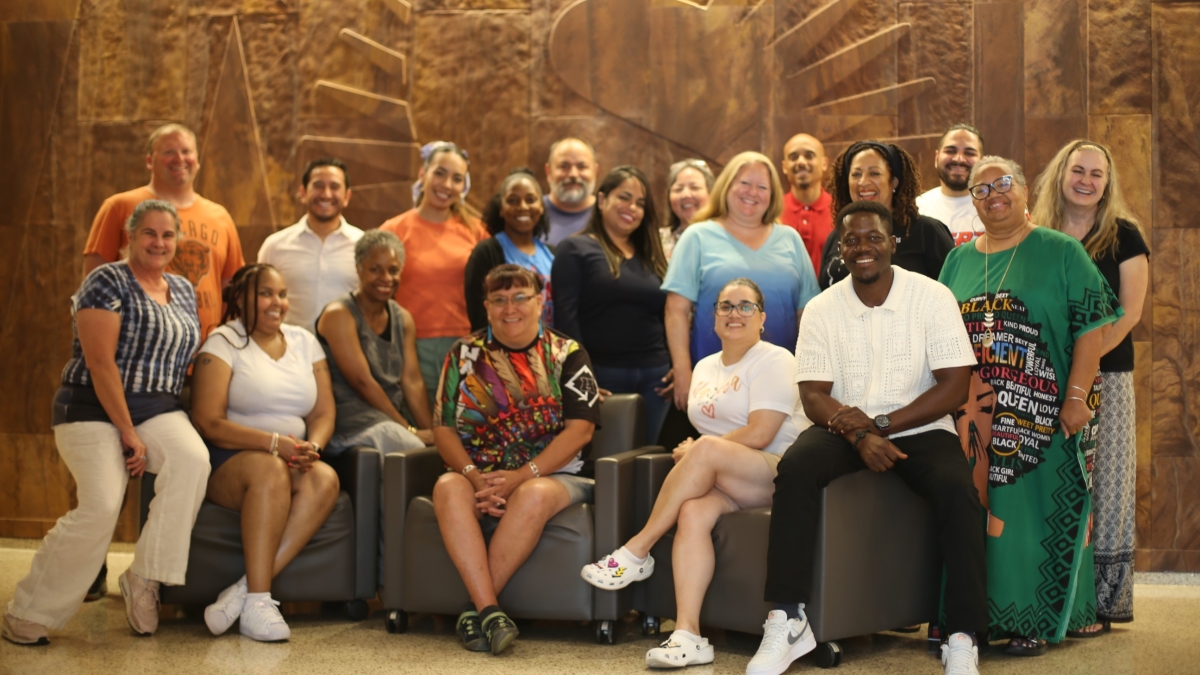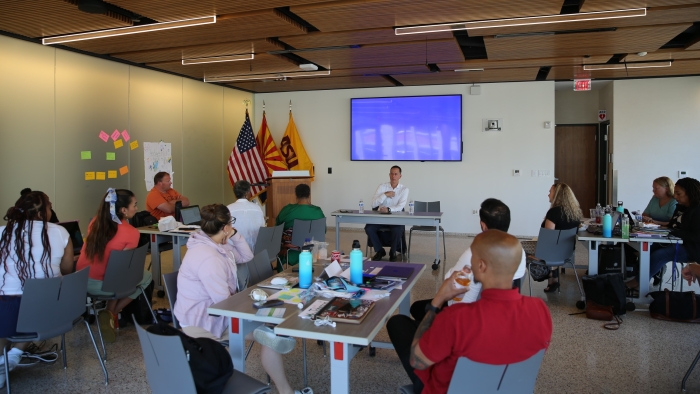Teachers gather in nation's capital to discuss civics in preparation for teaching during an election year

Teachers and ASU staff gather for a photo to commemorate the 2024 GeoCivics Summer Academy. Photo courtesy Hager Sharp
In addition to delivering regular curriculum, teachers often find themselves being asked to answer questions about myriad topics, and sometimes sensitive ones, like politics and religion — topics that become much more contentious during an election year.
“The list of things that we have to teach in the classroom is never-ending,” said Anna Naranjo, an elementary school teacher in Salt Lake City. Naranjo was one of 12 teacher participants selected to participate in the 2024 GeoCivics Summer Academy program.
Funded by a grant from the U.S. Department of Education and made possible through Arizona State University's Mary Lou Fulton Teachers College, the program aims to integrate geography across the social sciences to improve instruction for culturally and linguistically diverse student populations. The program supports students in Arizona and across the U.S. by providing professional development and resources to further educate, support and empower K–12 teachers.
In light of the upcoming presidential election, this year's program focused on civic engagement and advocacy.
When it comes to the myriad topics she’s asked to weigh in on, Naranjo added, "This topic (civic engagement and advocacy) feels like an obligation to me, a responsibility to me, to introduce in my classroom to talk about it. Even if all I can fit in is a week of lessons, and then we never talk about it again, if I can at least do that, then I’ll feel a little bit more fulfilled.”
The 2024 GeoCivics Summer Academy took place at ASU’s Barrett & O'Connor Washington Center in D.C., a fact that was not lost on the teacher participants.
“When you're teaching about a place, but you don't have that personal connection, it's sort of hard,” said Karen Guerrero, GeoCivics principal investigator. “A lot of these teachers are like, ‘Oh my gosh, I teach about this, but I've never been right here.’”
Thanks to the GeoCivics academy, teachers are getting the kind of firsthand experiences that bolster the lessons they take back to their students in the classroom.
Teachers are selected for the program based on a range of factors — diversity across grade levels, amount of teaching experience and cultural background — with one common theme: All of them must work with English learners.
Over the course of the weeklong academy, teacher participants enjoyed a jam-packed agenda, visiting, among other things, Arlington National Cemetery and the Belmont-Paul Women’s Equality National Monument, and also attended a Juneteenth parade.
“The one thing that sticks out to me, honestly, is helping (students) understand that there's other voices of history,” said Tre Johnson, a high school history teacher in Brooklyn, New York.
As part of the program, Johnson and the other teacher participants took a trip to Great Falls National Park, where a park ranger shared about Capt. George Pointer, an enslaved man who eventually gained his freedom and had a significant role in shaping Great Falls. Like many historic sites across the nation, Pointer’s story had been erased from its history until recently. For Johnson, uncovering these stories — even on a local level within his community — is a priority following the program.
“There are hidden voices, and many people's stories that haven't been told. And that's what we have to really look out for,” Johnson said. “The Great Falls experience just inspired me to do the same thing in Brooklyn. … Students can explore that neighborhood, explore that park, explore that housing development, and find and tell those stories that haven’t been told.”
Similarly, Joyce Tsinijinnie, an elementary school teacher from the Navajo Nation in Ganado, Arizona, shared that the full truth of Native American and Indigenous history is still rarely discussed, not just at historic sites but also in classrooms across the country.
“No matter where you talk about history, you're going to have to include the Native Americans, who were the first people here, and how they were removed,” Tsinijinnie said.
Although much of the learning that took place as part of the GeoCivics Summer Academy happened as teacher participants explored various historic sites, some of the teachers expressed how collaboration with the other participants was equally insightful.
“I came across so many sharp thinkers up there that just made me sharpen my own type of thing and make sure when I (go back to my school), (that) I'm on point, and that I pass the same thing to my other teachers,” Johnson said.
The weeklong program ended with a deep sense of community among participants.
“With it being my first years in my profession, I'm still learning a lot about the content and the instruction and what I should be helping my kids get to,” Naranjo said. “When I hear these professionals from the other grades speak to me and give me suggestions and guidance, I'm getting a better understanding of what our kids should be getting to.
She also appreciated the diversity represented in this year’s participants.
“Being surrounded with so many Black, brown and Indigenous educators — it’s healing for me because I can walk into the room and I don't have the burden of thinking that I'm going to have to speak up for what I represent: Latina, brown, all the different things that I encompass,” Naranjo said. “It feels great to be around them.”
More Arts, humanities and education

School of Social Transformation faculty member assumes new title with NSF
School of Social Transformation faculty member and Founding Executive Director of the Center for Gender Equity in Science and Technology (CGEST) Kimberly Scott is accepting a new position…

ASU's Neal Lester reflects on life, death of poet Nikki Giovanni
When Neal Lester heard on Monday that poet and activist Nikki Giovanni had died, the news hit hard.Lester, the founding director of Arizona State University’s Project Humanities and a Foundation…

Learning by stepping outside
By Adriana MaestasAmid a world increasingly captivated by all things digital, more than 200 Arizona teachers have crafted immersive educational experiences that nudge students to step away from their…
